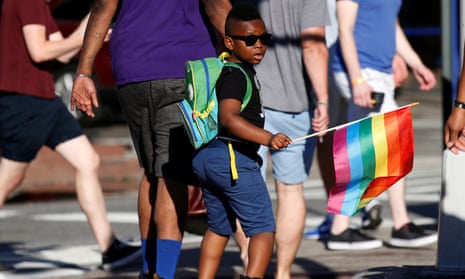One of the most dangerous and destructive things in the world is shame. Shame can burrow into you so deep that it shrinks the brain and constricts the heart.
Right now, a “row” – although it is not a row, which makes it sound harmless – is continuing between the teachers and parents of certain primary schools in parts of Birmingham and Manchester. The issue is that sex and relationship education is now part of the curriculum, with primary school children taught about healthy adult relationships and sex education compulsory in secondary schools, including LGBT relationships. Some parents, mainly from Muslim backgrounds, have objected to this. WhatsApp groups have been set up. Loudspeakers have been bought.
There have been objections, too, to a programme called No Outsiders, which challenges homophobia. One parent, Amir Ahmed, told BBC News: “Morally we do not accept homosexuality as a valid sexual relationship to have.” At the current count, five schools have pulled lessons as a result of protests.
This is heartbreaking. This is wrong. There are kids in these schools who are LGBT, or who will go on to realise that they are LGBT. Because it might be controversial for me to say, but I don’t know whether LGBT people are born or develop their identities.
Some will say: Oh I knew at the age of four. Others will fall in love with a mate at 50. I don’t have a definitive answer to the question when it is asked of me. It does not matter. I couldn’t care less about the length of someone’s index and ring fingers. Labels don’t have to matter either. What I know for sure is: it is not a choice. Who you love, who you are attracted to, who you share morning cups of tea with, who you pray for the safety of.
This is exactly the type of message the sex and relationship classes, and the No Outsider sessions, are designed to instil. They are there to say that different types of love and attraction are valid. They are there to cut out the shame at source. They are there to stop the word “gay” being thrown around as a playground insult, or as an adjective for crap trainers. To stop the word “faggot” from ringing in small ears, and stay ringing there into adulthood.

Nobody is suggesting that the “sex” part of relationship and sex education will be graphically explained to infants. Much of the No Outsiders lessons are focused on LGBT civil rights and the Equality Act. But time and again, homophobes and homophobic thinking fixate on sex. And, look, I am not saying that I am not obsessed with sex, because I don’t want to lie, but … the Gays, we have jobs. We have books to read. We’re not Doing It all the time. And what we do with our bodies is of no concern to anyone else. Our bodies are not a weapon to be used against us.
“Fundamentally,” Ahmed said, “[the lessons are] changing our children’s moral position on family values on sexuality.” Well, good. It is precisely the kids whose families think their very existence is immoral who need these lessons most. It is precisely these kids who will sit quietly at family dinners, swallowing their shame, having it sit in their stomach for decades.
Because children don’t come with prejudice in the box. Prejudice is learned behaviour. Why does the teen in year 11 think gay people are disgusting? Well, it’s because of how his dad reacts when he sees two men on the street holding hands.
Ahmed claims that: “It’s not about being homophobic … that’s like saying, if you don’t believe in Islam, you’re Islamophobic.”
But this is wrong. I fully respect the right of anybody to practise their religion and beliefs as long as that does not involve harming anyone else. It doesn’t matter which book people swear on in court, or the types of garment they may or may not wear. This isn’t about Islam, just as it isn’t about Orthodox Judaism or evangelical Christianity or Catholicism. There are gay Muslims and trans Christians and bisexual Jews. It is about not teaching or telling another: your humanity is less than mine.
Because it is ludicrous, as some parents have suggested, that these lessons are a threat to their own values, or about “promoting” gay lifestyles. It is reminiscent of the abhorrent section 28 and current legislation in Russia banning “gay propaganda”. (I don’t know, by the way, what a “gay lifestyle” constitutes exactly. As the brilliant Dyke Blanchett Instagram account puts it: lesbian culture is basically just a waiter asking you and your girlfriend whether you are sisters even though you’ve been stroking each other’s faces.)
As I was wondering why our politicians had stayed quiet on this issue, an intervention did come. And it was from Andrea Leadsom, whose contribution, as ever, was as welcome as a wave crashing through the front door. On LBC on Wednesday morning, Leadsom said that, on LGBT relationships, parents should get to decide “when children are exposed to that information”.
That “information”. As though the kids hadn’t noticed gay parents or families or neighbours or friends or celebrities. “Exposed”. As though gayness were somehow a contagion. As though children’s immune systems should be allowed to build up resilience. Leadsom’s language is dehumanising. It is the language so often used when it comes to minorities. It is the language of shame.
And do you know how long shame can last? It can last a lifetime. Sometimes, I tell cab drivers or shopkeepers or people at parties that I have a boyfriend. Because LGBT people have to make choices about coming out all the time, in each new scenario, and to each new person. We have Pride marches not just to educate others, but to educate ourselves: it is the maintenance training we give ourselves to remember not to feel shame. Because shame can kill. LGBT individuals have some of the highest rates of self-harm, suicide and mental illness.
How – as a mother – can Andrea Leadsom, and those other parents, feel OK with that? How can they countenance not wanting to give children the chance to live the life that is right for them? How is it that parents are gathering signatures on a petition to ensure that the experiences of children – quite possibly their own, as well as those of others – are more difficult? It is shameful.

